
19 minute read
The Store of Today Only Opens Tomorrow. Future visions
THE STORE OF TODAY ONLY OPENS TOMORROW
New store concepts break with pretty much every rule the fashion retail trade believed to be sacrosanct. By offering alternatives to classic instruments such as orders, product ranges, customer loyalty, and even opening hours, they demonstrate a great deal of courage and entrepreneurial spirit. In this context, digital tools are just as important as exclusivity – of experiences, not prices. Instead of discount promotions, the community is bound to the store by the uniqueness of its range. The shop evolves into a platform that can be readjusted whenever necessary. If there’s one factor that unites the new generation of retailers, it’s flexibility.
Text. Isabel Faiss. Photos: Esyvte, Roland Taennler, Wang Minjie, Davide Lovatti

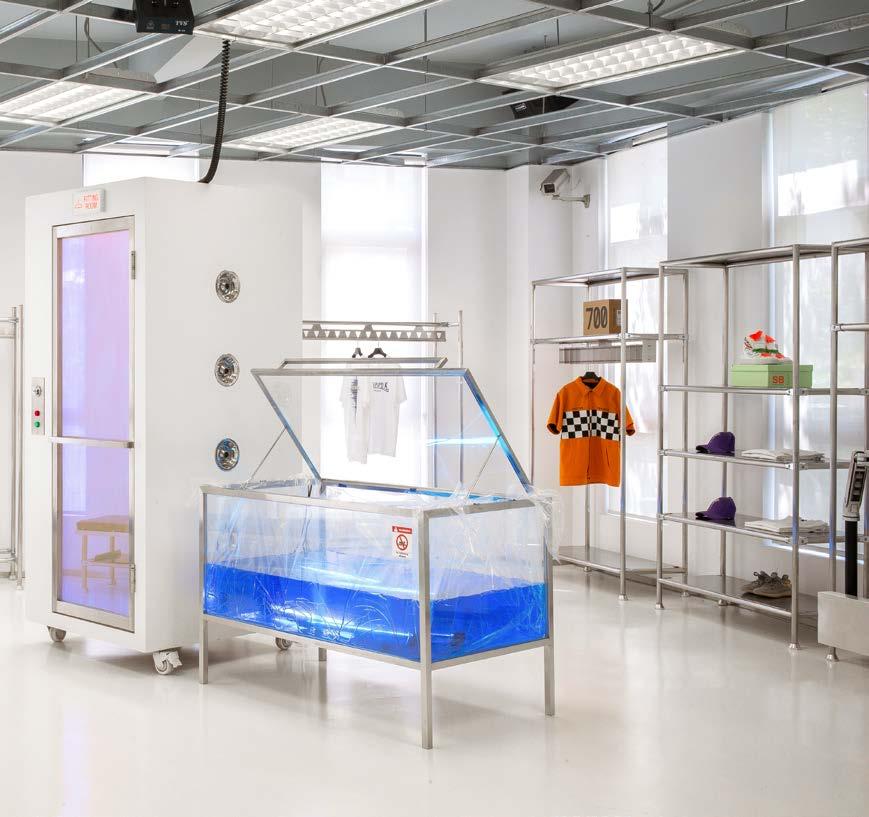

The Mix Land/Hangzhou The Chemical Reaction? A Big Bang!
Hangzhou is one of the 15 sub-provincial cities in China and boasts approximately nine million inhabitants. We might not have heard of this city before, but it has long since overtaken us in so many disciplines of urban lifestyle. Hangzhou is also one of the many Chinese “hidden champions” in terms of lifestyle trends and fashion. Nobody knew that either. Until the beginning of October last year, that is. That’s when, in Hangzhou of all places, the most talked about streetwear store opened. The Mix Land isn’t only designed as a laboratory for a (so far) quite unique concept in China, but also breaks new ground as regards content. The store designers, the team of XiangXiang in Hangzhou, allow the “who-iswho” of the international streetwear elite to collide unchecked.
One Store, One Statement
Concept stores are gaining momentum in China, but most of them are still integrated into large mall concepts. The Mix Land defiantly renounces the support of trade partners like Alibaba and foregoes visual merchandising. From the outside, one can only spot the store when one is actually looking for it. Unlike western streetwear temples, however, The Mix Land comes across as much more customer-friendly. This store has an attitude and is not sparing with allusions that can be interpreted as political in nature. The dressing rooms resemble security gates that neutralise any bias the customer in question may have. On a worktable, consumer goods are repeatedly broken down to molecular level in order to be reassembled anew – just like street culture itself. The latest sneaker models can be touched in a sterile incubator. It’s a tongue-in-cheek reference to the exuberant hype that some sneaker brands create around individual models. The Mix Land is, without doubt, an experiment that no longer needs to beg for the approval of its formula in a clinical trial. This is a real opportunity for a market in which independent multi-label concepts have not been tested sufficiently as yet.
The Mix Land. Manshenghou Jie, Building 12 Hangzhou/China, www.gooood.cn Brands: among others Air Jordan, A-Cold-Wall, Amiri, Champion, Forcerpblk, Heron Preston, Off White, Palm Angels, Supreme, Undercover, Yeezy
Furnished like a modern experimental laboratory: The Mix Land, Hangzhou’s new concept store, opened in October 2019 and is still perceived as an experi- ment by many.


Slow Design, the essence of modern luxury, is also the foun- dation of the design concept that the London-based architecture firm 6a implemented for Blue Mountain School.
Everything is for sale, but it’s not a store. This place proclaims the coexistence or art and commerce at the highest level.
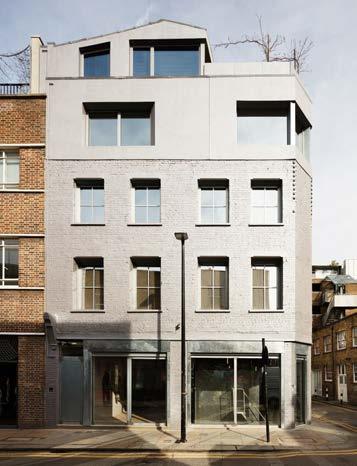
Blue Mountain School/London The School of Style
The idea of placing a bell next to the door is not new, but it is a statement of sorts. It may be debatable as to whether elitist, extraordinarily creative, and exclusive concepts such as the one in this six-storey townhouse named the Blue Mountain School, located in London’s East End, willingly accept or consciously promote the average citizen’s trepidation of entering, but at least walk-in customers don’t seem to be a parameter of economic success here. “We wanted the building to be both open and private at the same time,” according to James Brown and Christie Fels. The two founders of the avant-garde brand Hostem launched their unconventional concept in May 2018. Their aim was to provide answers to current questions pertaining to consumer society and the art industry, analogous to Brown’s statement in Wallpaper magazine: “Retail in its current form is dead.” Blue Mountain School quotes the ideal of the legendary Black Mountain School in North Carolina, which preached interdisciplinary harmony between individual art movement as early as 1933.
Half Private, Half Public
Blue Mountain School is not a store in the classic sense, even though everything inside is for sale. It also isn’t a gallery, even though everything inside is art. Those who make it through the door can browse through the Hostem archive in the basement, which offers unique insights into the fashion brand’s history. The floors above house a perfumery, a Michelin star restaurant, an interior design exhibition, and – on the top floor – a listening room in cooperation with a local record store. With the exception of the restaurant, which is always fully booked months in advance, one cannot speak of “abundance”. Following the principle of Slow Design, Blue Mountain School is an oasis of tranquillity within our consumer society. It specifically questions the mechanisms of the market by praising exclusivity and quality as the ultimate luxury.
Blue Mountain School. 9 Chance Street London/England, www.bluemountain.school Brands: among others BDDW Furniture, Eva Rothschild Furniture Tapestry and Ceramics, Hostem, Maos Restaurant, Valentin Loellmann Furniture
“This is not about shopping, but providing a platform for artists with integrity, who take their craft to its purist form and create meaningful, enduring work.” Christie Fels (New York Times Magazine)
Not Another Concept Store in Vienna is the brainchild of Creative Headz, an agency owned by Elvyra Geyer (second from left) and Zigi Muel- ler-Matyas (second from right).

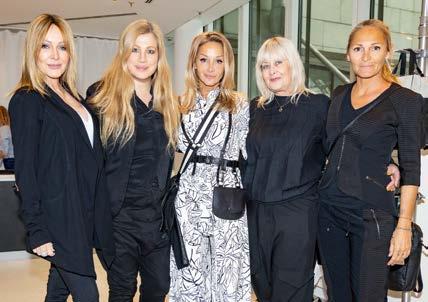
The store moved into its permanent loca- tion in the heart of Vienna’s city centre in May 2018.
Not Another Concept Store/Vienna The Curated Offline Marketplace
“We are too fast for online,” says Zigi Mueller-Matyas. She does not mean this in a disrespectful or figurative sense, but quite literally. The basic principle of the Not Another Concept Store fashion platform, located in Vienna’s city centre, is constant and rapid change. “Initially, we changed our product range every four weeks, now it’s eight. This probably makes us the only store with a complete turnover every two months. We only stock goods on commission and only a few brands have rented long-term slots in the store.” The driving force behind the store is the creative agency Creative Headz, whose owners Elvyra Geyer and Zigi Mueller-Matyas also organise the Vienna Fashion Week. The central mission of all the agency’s events and projects is always to promote national and international designers, newcomers, and artists who have not yet found a stage in the economically-oriented environment of the retail trade or would like to participate in this interdisciplinary platform consciously. “We curate fashion, a service that is hardly offered in the commercial fashion trade anymore. We dedicate our store to a different theme, country, style, or target group every month. We complement it with regular events, exhibitions, and collaborations with partners who need support – from fashion schools to designers seeking sustainable alternatives.”
The Fashion Lobbyists
Not Another Concept Store has been a permanent fixture in Vienna’s “Ringstrassen-Galerien” since May 2018. Given its unusual and fast-changing concept, it almost goes without saying that communication with the community primarily takes place online via social media. Not only the product range has to be updated every eight weeks, but also the customer. With a deliberately broad framework for the store, Creative Headz has picked up an idea that also flourishes online: a conceived, curated marketplace that perceives itself as a (temporary) presentation and sales platform while representing hardly any economic risk in terms of product range. An approach that leaves the painful problems of brick-and-mortar retailing – such as oversupply, product and price pressure, and returns – with the manufacturer. The commission model can be both a curse and a blessing, but it is nevertheless the best chance for young designers and newcomers to make the content and quality of their collections visible and experienceable. It is also the lowest threshold from an economic point of view.
Not Another Concept Store. Kärntner Ring 5-7, Vienna/Austria www.notanother.at Brands: among others Andy Knows Better, Buffet Clothing, Callista, Emma Sweet, Faulhaber Products, Form of Interest, Hardot Shoes, Marcel Ostertag, Milk, Pitour, Sabine Karner, Verdandy, Zmm Knitted Goods
“Our store has a complete turnover every two months.” Zigi Mueller-Matyas
I N T E R N AT I O N A L FA B R I C TRADE FAI R

M U N I C H FAB R I CSTART
M U N I C H FA B R I C STA RT. CO M
04 TH -06 TH
FEBRUARY 2020
Sweat-Yourself-Shop/Zurich The Living Shop Window
Micro-factory is currently one of the hottest buzzwords at fabric fairs. In everyday life, however, one rarely comes across the idea, unless one ventures to a small craft business to observe a true master at work. Freitag, a Swiss bag manufactory, has decided to explore the topic on a grander scale by opening the Sweat-Yourself-Shop in the heart of Zurich’s city centre at the beginning of July 2019. The name says it all. This is where you can design your own bag and make it yourself. A marketing coup that not only mirrors the customers’ desire for individualised products, but also embraces the liveliest way of addressing customers. Through the large glass fronts of the store, passers-by can watch how a Freitag bag is created. This enhances the credibility of the brand, which proclaims each of its products as handcrafted and unique, while returning the manufacturing process to the city centres.
Makes You Sweat!
Above all, manufacturing your own bag should be fun. “The primary purpose of our Sweat-Yourself-Shop is to convey our brand values and to communicate directly with customers. It certainly can’t compete with the nearby flagship store in terms of profitability. That was never the aim anyway,” says press spokeswoman Elisabeth Isenegger. Freitag markets the new concept as an experience, even as an event. The staging of a micro-factory, as well as all the values associated with it, could hardly have been implemented more consistently.
Sweat-Yourself-Shop. Grüngasse 21, Zurich/Switzerland, www.freitag.ch
“We’re extending our production chain – to right in front of your very eyes.” Freitag website
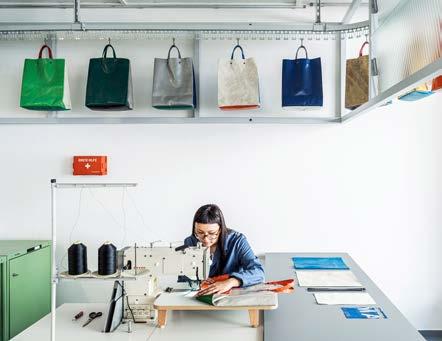
The Freitag Sweat-Your- self-Shop focuses on the individual- ised product. Customers can choose their own colours and make their own Freitag bag by hand.
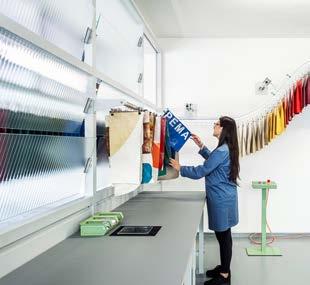
This is the definition of professional marketing in real time. The Sweat-Yourself-Shop conveys the core values of the Freitag brand: sustainability and craftsmanship.
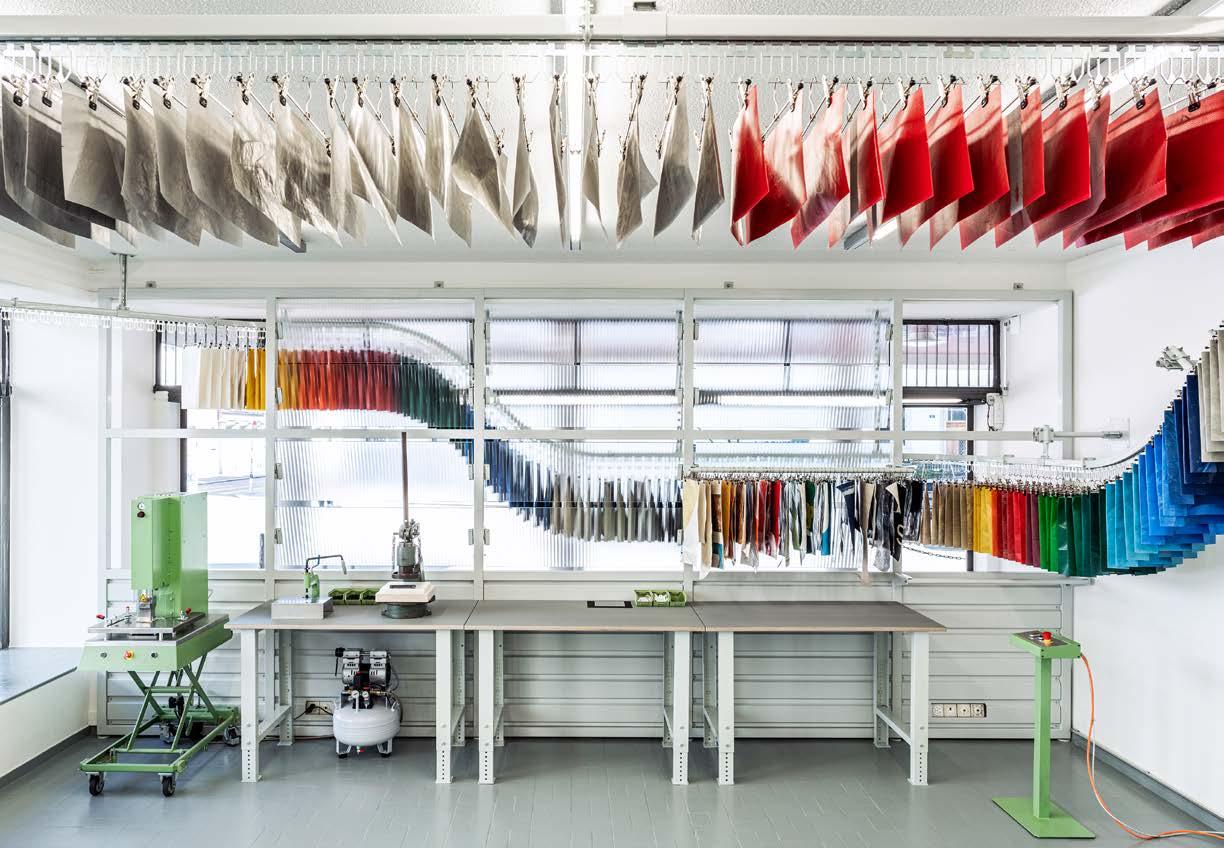

A new story is “published” every few weeks. Structured like a lifestyle magazine, the shop area tells different top stories. The cover theme of the launch in April 2019 was “Colour”.

Story at Macy’s/New York Store with a Story
A store that is structured like a lifestyle magazine – it dedicates itself to a cover topic, fills columns, and is published anew every few months. When Rachel Shechtman implemented her vision of Story in New York in 2010, she was well aware that her store in Brooklyn was in the direct vicinity of US department store giant Macy’s. Her concept looked like a lively speedboat next to a slow container ship – almost certainly a painful kick up the arse for Macy’s. However, Shechtman couldn’t believe that the geographical proximity would extend to the business front until the papers were signed in April 2018. Macy’s acquired Story and kept Shechtman on board. One year later, on the 10th of April 2019, the very first Story at Macy’s space opened in Macy’s on Herald Square in New York, serving as a flagship for the new shop-in-shop concept that was rolled out on the same day in 36 stores in more than 15 states. Boom.
The Experienceable Instagram World
“The Story at Macy’s experience feels a lot like a real life version of scrolling through Instagram. You discover things you weren’t looking for, but are inspired by all the fun finds – the second you see it, you need it! We aspire to create that feeling with the breadth of the narrative-driven merchandise edit we are bringing to life with the launch of Story at Macy’s across the country,” Shechtman said at the time.

They are all passion- ate about Story’s new, innovative concept: the entire team led by Brand Experience Officer Rachel Shechtman.

The Basic Principle
Shechtman rewrites her story every few weeks. Consequently, this also means that the entire product range changes at the same time. It devotes itself holistically to a new top story every time. This approach is feasible because it focuses primarily on small, largely unknown brands and, depending on the location, regional labels. Anyone seeking more information can approach the storytellers in the store, who can communicate everything about current and upcoming events. After all, that’s what they’re there for. All stories are supported by digital tools and gimmicks such as on-site VR campaigns that allow customers to playfully transform their own fashion style, for example. In short: an excellent template for a retail success story.
Story at Macy’s. Macy’s Herald Square, 151 West 34th Street, New York/US, www.macys.com Brands: among others Calvin Klein, DKNY, Popsugar, Shinola
“The Story at Macy’s experience feels a lot like a real life version of scrolling through Instagram.” Rachel Shechtman

www.f65punktnull.de
Spruce/Denver The One-Stop-Shop
Even the very first digital contact with Spruce is very personal. Becca and Taylor Romero share their entire story: how they met and became a couple, how the idea for Spruce was born and finally implemented. Why am I mentioning this? Because it symbolises what Spruce has embodied since it opened in June 2015: a focal point for men who either want a complete style makeover or just want honest and excellent advice from head to toe. Style counselling is the two founders’ mission. Spruce not only features a barbershop, but all sorts of things pertaining to the lifestyle of modern, urban men.
Sprucebot is Born
While Becca swiftly filled the store with products and customers, Taylor struggled – and ultimately failed – to find a digital tool capable of translating the idea of Spruce into a technical service tool for his own team and customers. That’s why he developed the Sprucebot, a kind of Alexa for the retail trade. “We focus on the one advantage brick-and-mortar has: the human experience. We have already built things that brick-and-mortar needs to thrive in the age of the Internet. But, like most things, it really comes down to timing. We needed something to run the experience at our boutique and it so happens that no one had really solved it yet,” says Taylor. “Sprucebot allows both our team and our clients to receive important information right when they need it. When a guest is about to arrive, it lets our team know who it is and what they want, so we can anticipate their needs and individualise their experience. And when guests connect to our Wi-Fi, they can receive promotions that entice them to make purchases while they are already in our shop.” Since the launch of Sprucebot in October 2016, the system has also proven itself in other stores.
Spruce. 4252 Tennyson Street, Denver/Colorado, US, www.spruce.me Brands: among others 7Diamonds, Brixton, Levi’s, Original Penguin, Stance
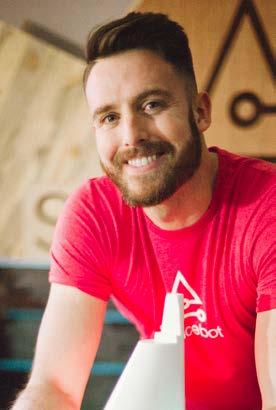
“After doing a bunch of research, we found there wasn’t actually a solution for managing the experience for our team members and guests. So, we had no choice but to build one.” Taylor Romero

The community and the customer are the focal point of Spruce. This is one of the reasons why the team developed the Sprucebot, a self-made digital tool that takes service to a new level.

A successful liaison: Attilia and Mariella Avino opened their boutique The Pink Closet in the five-star hotel Palazzo Avino in March 2019. A dream has been fulfilled.
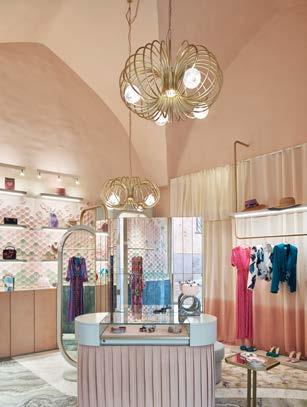
The Pink Closet/Ravello The Style Symbiosis
A small hotel boutique where local products, souvenirs, and the beauty products of the in-house spa are sold? Learned. But a completely independent in-house boutique with a comprehensive and very sophisticated fashion range as an overall concept? Heard of. When Mariella and Attilia Avino were offered the unique opportunity to open their own boutique in a small grotto-like room in the historic 12th-century Palazzo Sasso in May 2019, they seized it immediately. The palace also houses the fivestar rated Palazzo Avino hotel, by the way. The location: on the picturesque Amalfi coast with sea views. As part of the hotel, also known as The Pink Palace because of its paint coat, their The Pink Closet concept integrates seamlessly into the hotel’s comprehensive beauty and wellness programme, but also functions as an independent business – a symbiosis that benefits both sides. As Managing Director of the hotel and owner of the boutique, Attilia Avino has every opportunity to fine-tune her house’s offering. The Pink Closet itself relies heavily on niche labels and even less well-known, smaller brands.
A Room Where Miracles Happen
“I imagined an intimate and feminine place with a delicate atmosphere, a room of wonders to hold clothes and accessories resulting from attentive research. Architect Cristina Celestino has created this dream with the poetry and elegance that distinguish her,” says Mariella Avino, who mainly relies on international brands and inspirations to enthuse the sophisticated customers who visit her pink grotto. She is considered a style icon and describes herself as a true fashionista who has fulfilled a long-cherished dream with this boutique.
The Pink Closet. Via San Giovanni del Toro 27, Ravello/Italy www.palazzoavino.com Brands: among others Attico, Bluetiful, Leontine Vintage, Officina del Poggio, Oserèe
“I want my closet of dreams to become reality and now it has a real defined shape thanks to this project.” Mariella Avino
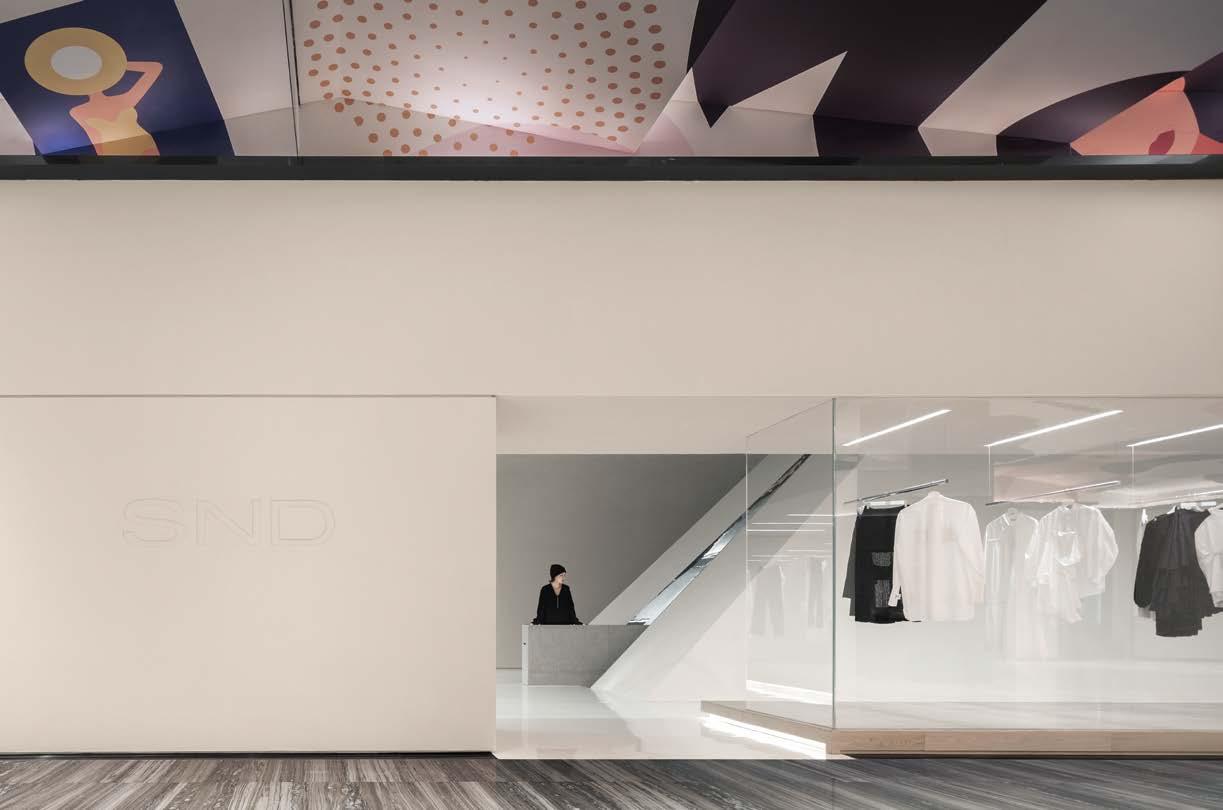
SND Boutique/Chongqing The Sacred Temple
Alice in Wonderland meets The Philosopher’s Stone. The Chinese interior studio Various Associates designed the new SND Boutique, which was opened in Chongqing in April 2019, as a futuristic fashion temple. Mysterious room constellations create suspense, while the purist reduction to the virtually non-existent single object and naked surfaces create an atmosphere of consumption that is unique in its brutality, even for China. The product remains unidentifiable at first glance, which constitutes a break with the striking Asian merchandising culture. The dramaturgy of the store first leads the customer towards a gigantic “milestone” in the centre. Everything is hidden behind it. Search and you shall find.
Non-Conformism as a Unique Selling Point
SND as an abbreviation for “Selection of Nonconformist Design” hits the nail on the head. SND Boutique was one of the first independent multi-label concepts in Chongqing as early as 2013, presenting international top labels such as Off-White, Martin Margiela, and Helmut Lang at local terms and in a coherent format with regional brands. This store claims an attribute for its concept and product range that rarely dominates in China: a clearly defined attitude. Fashion is an art here, not a consumer commodity. Design is elevated as something divine. In Europe, one would stumble over the self-imposed threshold on the first few metres, but China is only just preparing for the big leap.
SND Boutique. Shinkong Place, Chongqing/China, www.bysnd.com Brands: among others A Cold Wall, Ambush, Both, Cecilie Bahnsen, Dries van Noten, Ellery, Gray Matters, J Brand, Joseph, Paco Rabanne, Proenza Schouler, Ratio et Motus, Seen, Walk of Shame, We11Done, Yuul Yie
“The store is designed to be a medium where customers can explore the relation between body and space.” Various Associates
The new SND Boutique in Chongqing is characterised by bare walls, sacral heights, and exaggerated purism.


Homme Plissé Issey Miyake/Tokyo A Continuous Premiere
Homme Plissé Issey Miyake opened its first flagship store in Tokyo in July 2019, after presenting the collection to an international audience for the first time in January. It was a premiere for everyone, including Tokyo itself. The heart of the store is one of the huge ironing machines featuring a press and sewing unit – the kind that the designers use to create their iconic plissé pleats. Live on site, customers can witness how the elaborate 3D structures are created. Their success in the Issey Miyake collection resulted in a spin-off, as well as the creation of an independent brand, in 2013. The entire store is dedicated to “monozukuri no gemba”, the fun and surprise factor that accompanies every product development process. This form of transparency is not only completely new territory for the Japanese design community, but also a novelty in the international high fashion market.
Technology First
Issey Miyake was already perceived as a retail visionary when he launched the Reality Lab in Tokyo in 2013. Back then, too, architect Tokujin Yoshioka was in charge. In the case of Homme Plissé, his main concern was yet again to showcase the fascination created by the
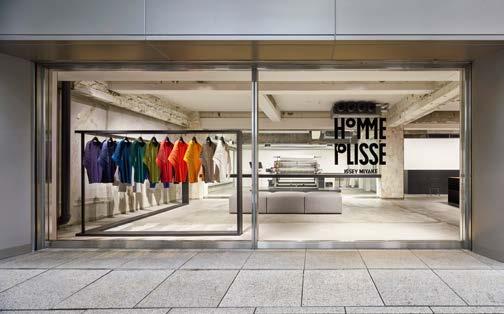
fusion of modern technology and traditional Japanese craftsmanship. The large glass fronts draw the customer’s attention to the production area. It’s a door opener, which lowers the inhibition of passers-by. For Issey Miyake, this marks a change of approach – the healthy dose of down-to-earth attitude that Japanese customers appreciate so much.
Homme Plissé Issey Miyake.
3-18-14 Minami Aoyama, Minato Tokyo/Japan, www.isseymiyake.com
“The store’s concept focuses on the fun and surprise effect of the ‘monozukuri no gemba’ (working method).” Tokujin Yoshioka
Issey Miyake is considered a retail visionary in Japan. With the new Homme Plissé store, he once again proves why. The focus here is on the product and its development.












